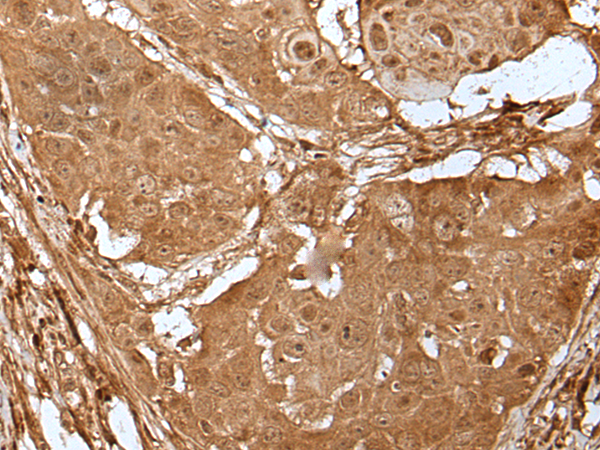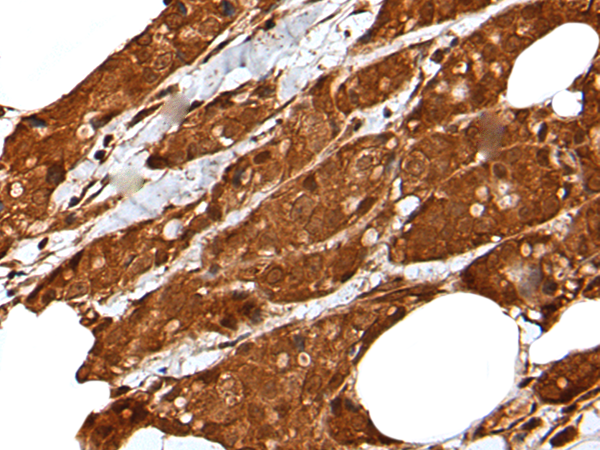

| WB | 咨询技术 | Human,Mouse,Rat |
| IF | 咨询技术 | Human,Mouse,Rat |
| IHC | 1/40-1/250 | Human,Mouse,Rat |
| ICC | 技术咨询 | Human,Mouse,Rat |
| FCM | 咨询技术 | Human,Mouse,Rat |
| Elisa | 1/5000-1/10000 | Human,Mouse,Rat |
| Aliases | EL; EDL; PRO719 |
| Host/Isotype | Rabbit IgG |
| Antibody Type | Primary antibody |
| Storage | Store at 4°C short term. Aliquot and store at -20°C long term. Avoid freeze/thaw cycles. |
| Species Reactivity | Human |
| Immunogen | Fusion protein of human LIPG |
| Formulation | Purified antibody in PBS with 0.05% sodium azide and 50% glycerol. |
+ +
以下是关于LIPG抗体的参考文献示例(注:内容为示例性概括,具体文献需根据实际数据库检索确认):
---
1. **标题**:*Endothelial Lipase (LIPG) Promotes Tumor Angiogenesis in Non-Small Cell Lung Cancer*
**作者**:Zhang Y, et al.
**摘要**:研究通过免疫组化(使用LIPG特异性抗体)检测LIPG在非小细胞肺癌中的表达,发现其高表达与血管生成标志物CD31相关,提示LIPG可能通过调节肿瘤微环境促进癌症进展。
2. **标题**:*Monoclonal Antibody Targeting LIPG Suppresses Atherosclerosis in Mice*
**作者**:Brown CM, et al.
**摘要**:开发了一种靶向LIPG的单克隆抗体,实验显示其能有效抑制LIPG酶活性,降低动脉粥样硬化模型小鼠的斑块形成,表明LIPG抗体在心血管疾病治疗中的潜力。
3. **标题**:*LIPG as a Biomarker in Triple-Negative Breast Cancer: Immunohistochemical Analysis*
**作者**:Wang L, et al.
**摘要**:利用LIPG抗体对三阴性乳腺癌组织进行染色,发现LIPG高表达与患者生存率负相关,提示其可能作为预后标志物及治疗靶点。
4. **标题**:*Role of Endothelial Lipase in HDL Metabolism: Insights from Antibody-Based Inhibition*
**作者**:Johnson RB, et al.
**摘要**:通过抗体阻断LIPG功能,研究其在HDL代谢中的作用,发现LIPG抑制可显著升高血浆HDL水平,为调节脂代谢提供新策略。
---
建议通过PubMed或Google Scholar以“LIPG antibody”、“Endothelial Lipase therapeutic antibody”等关键词检索获取具体文献。
Lipoprotein lipase G (LIPG), also known as endothelial lipase (EL), is a phospholipase A1 enzyme encoded by the *LIPG* gene. Primarily expressed in vascular endothelial cells, it plays a key role in lipid metabolism by hydrolyzing phospholipids on circulating lipoproteins, particularly high-density lipoprotein (HDL), influencing HDL cholesterol levels. Unlike other lipases, LIPG exhibits distinct substrate specificity and regulatory mechanisms, making it a critical focus in cardiovascular and metabolic disease research.
LIPG antibodies are tools used to detect and study the expression, localization, and function of this enzyme. They are widely applied in techniques like Western blotting, immunohistochemistry, and ELISA to investigate LIPG's role in pathologies such as atherosclerosis, inflammation, and cancer. Studies suggest LIPG overexpression may promote endothelial dysfunction and plaque formation, while its inhibition could enhance HDL levels, offering therapeutic potential. Antibodies also aid in exploring LIPG's non-lipolytic functions, including cell signaling and angiogenesis regulation.
Recent research highlights LIPG as a biomarker or therapeutic target, driving demand for high-specificity antibodies. Commercial antibodies target epitopes in LIPG's catalytic domain or N-terminal region, though variability in validation methods requires careful experimental optimization. Ongoing studies aim to clarify its dual roles in lipid homeostasis and disease progression, underscoring the importance of reliable LIPG antibodies in both basic and translational research.
×